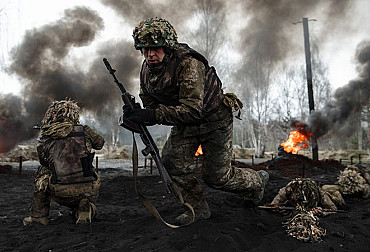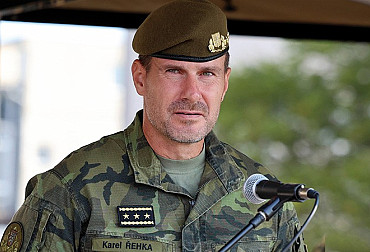Interview with Minister of Defence Jana Černochová
This year many important events took place not only for our army. There were key changes in defence legislation, such as the law on defence financing (2% of GDP for defence) and amendments to the conscription laws to prepare citizens more effectively for national defence and to make active reserve service more attractive. This year also saw the conclusion of a number of strategic acquisitions for the Army and other major modernisation purchases are under negotiation. Given the current security situation, existing defence strategies and concepts have also been revised. It is not only in connection with these events that we asked Minister of Defence Jana Černochová for an interview.

Minister, how satisfied are you with the start and progress of the modernisation processes of the army?
I am glad that we have managed to start large modernisation projects that nobody wanted to start for years. We are rapidly catching up with the backlogs of the past, moreover, in a situation where, due to the deteriorating security situation, everyone is getting arms, which is causing prices to rise and delivery times to increase. Nevertheless, we are working hard to complete all the major modernisation projects, be it BVP, tanks, helicopter aviation and many others. A major project is, of course, the decision to procure the F-35 supersonic aircraft to address the future of supersonic aviation.
But I do not want to make it look like the modernisation of the army is just about buying equipment and weapons. We're also reforming recruiting or veterans care. I will be satisfied when the army is modernised, we get rid of old equipment, we are comparable in equipment to NATO armies and we have as many professional and active reserve soldiers as we plan to have. I won't see that as Defence Minister, but I want to be the one who has embarked on that journey and who has helped to move the Defence Department colossus forward by leaps and bounds.
Where does the Army stand at the moment with the preparation of the Concept of the Construction of the Army of the Czech Republic 2035?
The new Concept of the Construction of the Army of the Czech Republic 2035 is in the final stage of preparation, it has passed the internal ministerial comment procedure and will be submitted to the BRS (National Security Council, editor's note) and the government in the near future. Just like the new defence strategy, it takes into account the new risks and security challenges we face not only in connection with ongoing conflicts, but mainly with the changes in the contemporary world, be they technological, economic, environmental or demographic changes. We must learn to face up to the threats that are coming. The military must be able to operate effectively on all types of battlefields and be able to operate across these domains, i.e. land, air, water, space and cyberspace. However, the work on the new CFAC is primarily the responsibility of the Army, so you have to ask the General Staff for details.
As a minister, can you draw a comparison between conventional tenders and government-to-government purchases?
For large strategic purchases, especially of weapons equipment, the government-to-government system makes more sense. For some acquisitions, there is no other way. The F-35, for example, simply cannot be bought any other way. In addition, the system of directly approaching the government of another country allows taking into account many parameters that a standard competition under the Public Procurement Act would not be able to take into account. And in practice, the government-to-government system has been shown to provide a greater degree of legal certainty and assurance of the reliability of the purchase in many cases. Very importantly, government-to-government purchasing also allows us to deepen defence cooperation with the relevant foreign partner. Which has benefits for our companies, because we always try to negotiate maximum industrial cooperation. This system is completely transparent, because the government simply tells us clearly who it is negotiating with, what it is negotiating and why.
On the other hand, it is clear that the government-to-government system is only suitable for unique and strategically important things like supersonic aircraft, BVP, helicopters or something similar. On the other hand, common commodities like ammunition are better suited to competition because there are multiple manufacturers and competition can drive down the price.
As part of your Ten for Defence, you mentioned at the beginning of your term the need for legislative changes. At what stage are these changes? Or are you planning any changes to the Public Procurement Act to speed up and streamline the selection process?
Most of the legislative changes I promised are already in place. We already have the two per cent of GDP for defence in law, and we have also enacted a new system for financing strategic projects. Furthermore, we have managed to push through a comprehensive amendment to the defence legislation, which has introduced a completely new institution of voluntary predetermination, made the active reserve system more attractive and facilitated defence planning, because as a defence ministry we have gained access to data that the state has long had but could not use because of the old legislation.
All that is behind us and now we are all learning to work with it. For example, the budget proposal for next year is in the House. It has already been drawn up with a target of two per cent of GDP for defence. Thanks to the mandatory reporting of defence expenditure in other chapters, we have identified CZK 8.6 billion which, although not part of the Ministry of Defence budget, is recognisable as defence expenditure because it helps the Czech Republic to ensure its security.
On the list of the army's modernisation projects, we can tick off new helicopters, tracked BVP or 5th generation aircraft. Can you tell us at what stage the negotiations on the acquisition of Leopard 2A8 tanks are at, or what other major acquisitions are planned?
The acquisition of the Leopard 2A8 tanks is indeed one of the major acquisitions as it is related to building a heavy brigade. We are negotiating a joint purchase with Germany because it has its advantages, for example, an agreement on better conditions with the manufacturer, especially in terms of price, delivery time. KMW, which produces the Leopard tanks, could increase production capacity as a result of the size of the delivery, which would speed up production considerably. A huge advantage of joint procurement would be to ensure maximum interoperability within NATO.
Negotiations are ongoing at the moment, and we expect clarity to come within the next year. In terms of other major acquisitions, we have entered into negotiations with Embraer of Brazil for the potential acquisition of C-390 Millennium medium transport aircraft. We will be negotiating for the acquisition of two of these aircraft, with the aim of concluding these negotiations next year.
The contract for the F-35s is expected to be signed shortly. Could you please indicate how the Gripen operation is or will be ensured within the Air Force until the arrival of the F-35 aircraft?
The contract for the F-35 will be signed in the next few weeks, once we find a suitable common date and all the mandatory administrative tasks have been completed. We are negotiating with Sweden to extend the Gripen lease until 2035, until we have all the F-35s, so that we have continuous airspace protection. I will not give details of the negotiations with Sweden, but I can say that we are coming to a good end.
Otherwise, the operation of the Gripen will be technically assured in the same way as it is now, but there will be a parallel with the preparatory work for the transition to the F-35. It won't be easy, of course, but I'm not worried that the soldiers won't be able to handle it.
The rearmament of the Army is taking place at all levels, from the personal weapons of individuals to highly sophisticated systems. Do you think that the Army is "mentally" set for this relatively large qualitative leap in its armaments?
I am convinced that it is. Soldiers are looking forward to the new equipment and I perceived frustration that some are still using equipment that remembers their dads and grandfathers. Conversely, continuing to overstay our welcome would mean not only that we have outdated equipment, but also personnel problems because soldiers want and need to serve in a modern Army, not a museum. I also expect major acquisitions and modernization to attract new servicemen and women.
The second thing is that rearmament of the military is not going to happen overnight. We're talking about a horizon often longer than a decade. In that time, a huge number of young people will be joining the army who will find it unimaginable to serve with equipment from the distant past.
The modernisation of the army should be apolitical and does not end or begin with the mandate of a minister. At this point, two years before the elections, is there not room for a broader parliamentary debate between the political parties to ensure the continuity of these processes into the future?
I try to communicate with the Opposition and, as far as possible, keep them informed about all important projects, whether it is the Bev or the F-35, but also the DCA, and I am definitely in favour of ensuring that the projects that we start continue in the future. I don't feel that we should be afraid that we won't, because I perceive that there is a consensus over the modernization of the military. Despite the occasional skirmishes and criticisms, which seem to me to be more of a 'must do'.
I regularly attend the Defence Committee and, outside of it, I have held a number of meetings for Members at the Ministry of Defence, during which my colleagues and I have briefed them on what is being planned and why.
Given that we base major modernisation projects on the requirements and needs of the soldiers themselves, I cannot imagine that future governments, whatever they may be, will want to jeopardise these projects in the future. It would not only mean undermining the needs of the army, but also frustrating the resources invested and hugely delaying the modernisation of the army, which is exactly what we absolutely cannot afford.
The 2% of GDP for defence is the law, how do you feel about the announcement to revise this law?
Two per cent for defence is the minimum that now comes from our membership of NATO and that we need to have a modern and combat-capable army. If the opposition gets into government after the elections, they can revise our law if they find a majority in parliament to do so. But I can't quite see how he wants to justify it. That they are changing the law so they can stop respecting our NATO commitments? I wouldn't want to say something like that to our allies in the Alliance.
The foundation of the military is the soldier. How do you think recruitment and retention is going? And how is the recruitment of active reserve soldiers going? Shouldn't the current target numbers be significantly increased depending on the current security situation?
The priority is 30,000 professional soldiers and 10,000 AZ members in 2030. We are doing our best to achieve this, but the recruitment system has its limits, which we are trying to push and simplify the whole process so that more candidates can go through it. For example, a virtual recruitment center should make the whole process easier and more convenient for both recruit and recruiter, and we are also planning changes to the health decree. I also have no doubt that new technology will attract more people interested in serving in the Czech Armed Forces, including technical experts, of whom we have a shortage not only here but in the entire labour market. Once the army has such sophisticated technologies as the F-35 aircraft, CV90 biplanes or, for example, modern radars, I have no doubt that many experts will want to get acquainted with them.
Do you foresee more support, training and equipment for members of the active reserve? What is the experience of their involvement in military missions?
We are counting on it, and we have already done a lot for it. As I said, the goal is to have 10,000 active reserve members who will be full partners of professional soldiers, including equipment and gear. The amendment to the conscription legislation has made active reserve service more attractive and increased, for example, the financial remuneration.
Today, reservists take part in missions, we have sent them with soldiers to help protect the border with Slovakia, and they have served in the Baltics, Slovakia and other places. Overall, it appears that the active reserve is a viable concept that benefits everyone. It allows the army to gain a lot of experience and know-how from the civilian sphere and, in turn, the civilians to learn something from the army.
The government has adopted the document Defence Strategy of the Czech Republic, which sets the parameters for the state's defence activities in impending conflicts, including defining the potential enemy. Will you be preparing some kind of "implementation document" that will translate the strategy into practical life?
This is a process that has been in place for years and is defined, among other things, by the strategy itself. The individual elements of the strategy will be followed by the conceptual, implementation and planning documents of the Ministry of Defence. These include, in particular, the National Defence Master Plan and other national defence plans, the Long-Term Defence Outlook, the Concept for the Construction of the Army of the Czech Republic, the Concept for the Operational Preparation of the State Territory, the Concept for the Preparation of Citizens for the Defence of the State, the Concept for the Mobilisation of the Armed Forces of the Czech Republic, and the Strategy for Armaments and Support for the Development of the Defence Industry of the Czech Republic. We plan to update these documents on an ongoing basis if necessary.
How important are the state-owned enterprises established by the Ministry and what are the plans for these enterprises in the future?
One of the many things that the conflict in Ukraine has shown us is that there is a huge advantage in conflict if you can repair your own military equipment and are not dependent on external suppliers. That is why we want to continue to support state-owned enterprises. Their aim is not primarily to make a profit, but to maintain the capabilities and know-how that are essential for the defence of the country. In peacetime, this is not visible, but in a crisis, the state must have the capacity to repair and produce. The support of state-owned enterprises is also envisaged in the Strategy for armaments and support for the development of the Czech defence industry. Moreover, it turns out that state-owned enterprises are able to establish themselves on the private market, many of them work with cutting-edge technologies and are easily competitive. So, in other words, this is a viable concept that we definitely want to continue to support.
Care for war veterans is an important part of your work. What message would you have for the soldiers who will one day finish their service to our country?
First of all, I would like to express my deep respect and gratitude to them for choosing to serve their country in a difficult and very restrictive way, and for being willing to risk their health and life for it. And I would like to assure them that the state will not turn its back on them even after they have completed their service. We are doing our best to do that as well. We are creating a whole new network of care for veterans. Starting in January, there will be new War Veterans Support Agency staff in every county. And gradually, new War Veterans Care and Support Centres will also be created, building on the original idea of community centres.
The year 2024 marks the half-century anniversary of our entry into the North Atlantic Treaty Organization. What do you think the past 25 years of our membership in NATO have shown and what challenges and tasks await us to be valid members of the Alliance structures?
Membership of the Alliance represents the strongest security guarantees in more than a hundred years of our independence. What would pre-war Czechoslovakia give for today's alliance. NATO is for us a guarantee of security and peace, a guarantee that there will be no war. But it also means obligations - to build our own defence, to participate in collective defence, to fulfil our commitments. Only a strong Alliance will command the respect of adversaries, only modern armed forces will deter adversaries from the idea of going to war with us. Military modernization, recruiting, two percent of GDP for defense, the F-35 - we don't do all this because we want to go to war. We're doing this so that future adversaries will realize that if they try something, they'll break their teeth. Some NATO members have done this traditionally, we have been on a long ride, and now we are catching up.





















